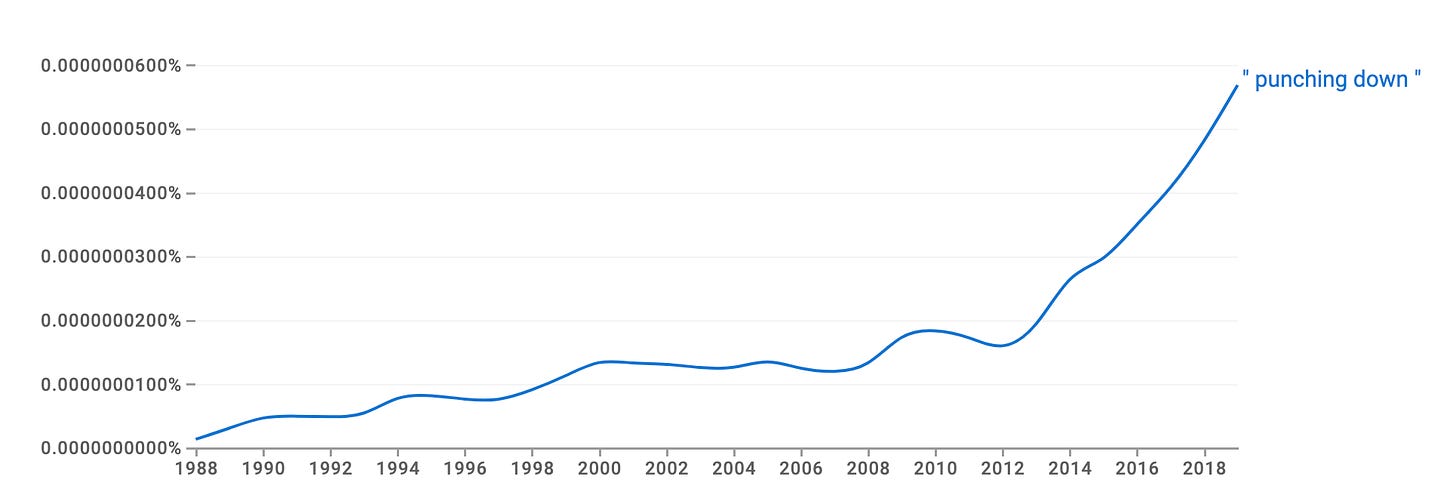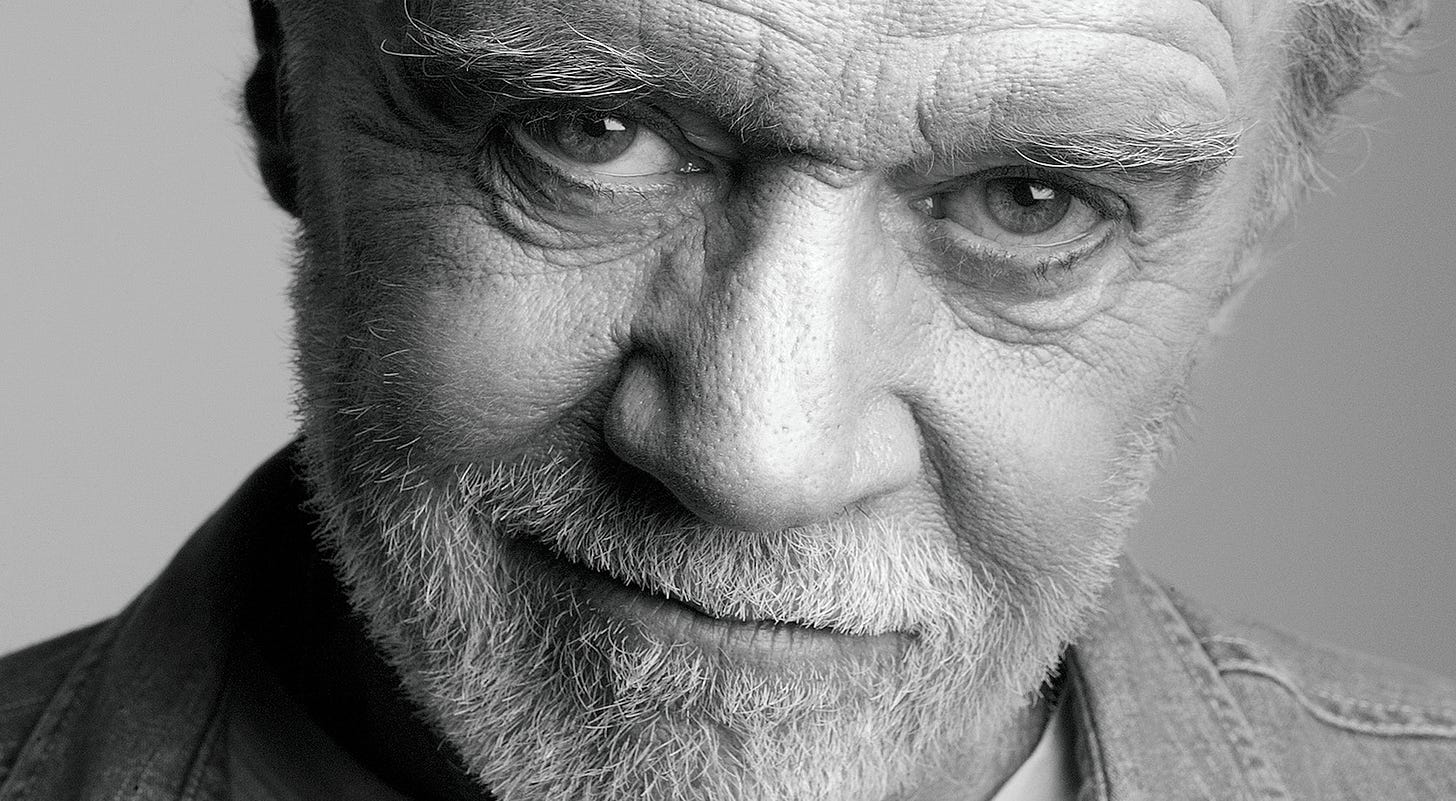George Carlin and the Truth About "Punching Down"
You can make people laugh and think at the same time, but not if you're only punching in one direction.
More than 15 years after his death, George Carlin continues to trend on social media several times a year. Why? Not for any of his legendary standup bits, but for a 1990 Larry King interview clip in which he expressed views that can be interpreted, through today’s political lens, as an endorsement of the “punching down / punching up” theory of comedy. This modern view asserts that “good” comedy must only crack jokes at the expense of those deemed to have power, thereby “punching up” — and must never target people considered marginalized, known as “punching down.” Dave Chappelle and Ricky Gervais have been widely attacked as punching down with their routines about trans issues. Bill Maher has come under fire for his material about the obesity epidemic. Similar critiques have spread beyond standup comedy and into music, commentary, films, and beyond. But this notion of directional punching is fundamentally ill-conceived, often invoking the legacy of George Carlin, who was never the patron saint of social justice comedy that our revisionist culture cops try to portray him as — and thank Pesci for that.
George Carlin discussing fellow comedian Andrew Dice Clay’s standup act in a 1990 interview on Larry King Live (1985–2010).
Linguist Ben Zimmer has traced the earliest known usages of the phrases “punching up” and “punching down” to mid-20th century sports writers who used them literally to describe boxers punching above or below their weight class. According to Zimmer, It wasn’t until 2002 that the terms first took on a semi-metaphorical tone in an article in The Times of London about a soccer manager striking one of his players. It was still used in a sports context, and still described literal punching, but it began referring to what has come to be known as “power dynamics” — in this case, between a coach and his player. By 2006, the evolution was complete when Keith Olbermann, himself a sportscaster-turned-MSNBC-pundit, used the terms in a purely metaphorical sense to contrast himself with his Fox News foil, Bill O’Reilly, by saying, “You don’t punch down. If you’re in my position, you punch upwards.”
In the years since, the terms have lost virtually all literal meaning, merging with critical-theory-inspired social justice thinking and the oft-resurfaced clip of George Carlin’s King interview to mean “anyone who takes a shot at someone less powerful than themselves.” While Carlin never said the words “punching up” or “punching down”, he is credited as having been among the earliest voices (and by a mile the most cited) to have given voice to the concept.

This is more than a little ironic, considering the fact that George Carlin spent over four decades lambasting euphemisms, political correctness, and language policing. This is the guy who joked about calling feminists “cum catchers”, described lacrosse as a “faggoty college activity”, and ridiculed women who complain about bad hair days as “shallow cunts.” What people misunderstand about George Carlin in general, and his remarks in that interview in particular, is that Carlin was never on anyone’s side. He was a nihilist who hated every political faction; an equal-opportunity offender who saw the world as a doomed circus and resolved to enjoy the freak show while it lasted. His allegiance wasn’t to the left or right, but to funny. When Carlin commented on joking about underdogs, he was not passing moral judgment, but rather a professional opinion about what was funny — an opinion which he himself often contradicted, which gets to the heart of what’s wrong with the concept of punching up and down.
The problem with any attempt to classify people by “power”, as I have written previously, is that no one can agree on what constitutes power, nor on which kinds of power matter more than others. Society cannot agree on whether skin color matters more than socioeconomics, on whether sexuality or gender identity matters more than institutional influence, and on where Jews and Asians fit in all of this.
Some people see a straight white man in Appalachia living in poverty and see a textbook example of the downtrodden; others see only a straight white man and thus someone with power and privilege to trump a black lesbian lawyer. Power is not a simple thing. It exists in myriad forms. Every 60-year-old male CEO has the power to fire a 25-year-old female employee, or to make her work very unpleasant. This is power. Any 25-year-old female employee has the power to completely destroy their male boss’s career and reputation with a single accusation on social media. This, too, is power. So is being tall, attractive, intelligent, having a full head of hair, an amiable personality, and so on.
To reduce power to one’s skin color, identity group, or bank balance, as American numbskulls so often do, is to view the night sky through a keyhole. Our inability or refusal to grapple with the true complexity of power is why we should treat the concept with humility, not absolute confidence. It’s why we should treat everyone as individuals instead of trying to do the supercomputer calculations required to determine the full contextual extent of one’s actual power or lack thereof. But, as Carlin once joked, “we don't have time for rational solutions.”
Rowan Atkinson, of Blackadder and Mr. Bean fame, who sits atop my own personal comedy Mount Rushmore alongside Carlin, encapsulates the problem with punching down in a 2022 interview in The Irish Times:
“It does seem to me that the job of comedy is to offend, or have the potential to offend, and it cannot be drained of that potential. Every joke has a victim. That’s the definition of a joke. Someone or something or an idea is made to look ridiculous. [...] I think you’ve got to be very, very careful about saying what you’re allowed to make jokes about [...] You’ve always got to kick up? Really? What if there’s someone extremely smug, arrogant, aggressive, self-satisfied, who happens to be below in society? They’re not all in houses of parliament or in monarchies. There are lots of extremely smug and self-satisfied people in what would be deemed lower down in society, who also deserve to be pulled up. In a proper free society, you should be allowed to make jokes about absolutely anything.” [Emphasis added.]
Carlin’s observation that comedy typically selects people in power as its targets is difficult to quantify, but generally seems to be true. History is filled with writers, critics, and satirists lampooning people in power. The reasons for this are less moral than they are pragmatic and practical. People at the top have always had large bullseyes on their backs for reasons ranging from the comparatively greater consequences of their flaws, to the fact that they are well-known figures audiences will recognize, to envy, political scheming, and differences of opinion. Note also that these are people “in” power, not people “with” power. A king, prime minister, or president is someone “in” power — a clearly defined position of authority that no one can dispute. People “with” power today refers to groups like “white people” or the “cis-gendered” — meaningless umbrella labels that lump billions of people together as monolithic entities.
These shifting notions about power have given birth to “woke” comedy, for lack of a better term — comedy that assiduously polices itself so as to conform to the far left’s conception of power dynamics and progressive politics. It results in a product that is often unrecognizable as comedy, ranging from identity-conscious cringe comedy to whatever the hell Hannah Gadsby does on stage. Doing comedy correctly isn’t supposed to be “correct” in any social or moral sense. “Correct”, in the context of comedy, means funny. Audiences have become conditioned over the years to clap at “jokes” that don’t evoke genuine laughter, but which espouse the “correct” social messages. One need only tune in to Jon Stewart, John Oliver, and Stephen Colbert to see this in action.
There’s a reason why today’s left has caught up with their right-wing brethren in becoming so excruciatingly unfunny. They have lost touch with humor at its most fundamental level. It is now commonplace to encounter leftists who evince a total ignorance, whether feigned or authentic, about how metaphor, analogy, irony, parody, satire, and jokes work. These dour blockheads have become the modern equivalent of the 1960s conservative squares or the 1990s Christian PTA moms. And given the proliferation of far-left cultural thought throughout education, journalism, publishing, technology, nonprofits, and entertainment, our intrepid up-punchers are hardly doing so from the margins of society. They have, in a sense, become the establishment — the ones with power. To resist this buzzkill radicalism is, in fact, to punch up.
As the wonderful 2022 HBO documentary George Carlin’s American Dream pointed out, it is remarkable that Carlin continues to remain relevant, given how topical and fleeting most standup material is. More than that, his comedy seems to transcend political divides, leading many on both the right and the left to claim him for their own. This dynamic illustrates the limitations of only punching up or down, even if we had a coherent concept of what that meant. George Carlin’s brilliance, legacy, and broad appeal rests not in who he joked about — but in the fact that no one was spared from his biting wit. He joked about people of every walk of life, from fat people to health nuts, from greedy corporations to smug environmentalists, from religious conservatives to the PC language police. He punched in every direction, which freed him to joke about whatever the fuck he wanted while giving him the credibility no partisan or ideologue could ever dream of. Life, to invoke Carlin’s penultimate HBO special, may be worth losing, but it’s too short to squander by putting blinders on your mind. In a world where everyone is full of shit, everyone is also fair game.
See also: “It’s a Big Club, and You Ain’t in It”
Subscribe now and never miss a new post. You can also support the work on Patreon. Please consider sharing this article on your social networks, and hit the like button so more people can discover it. You can reach me at @AmericnDreaming on Twitter, or at AmericanDreaming08@Gmail.com.





See also South Park. Those guys make fun of virtually everyone on all sides, and I love them for it.
Unforgivable. No Jimmy Carr reference? Hands down, Carr is the most offensive comedian of all time. Chappelle got criticized for telling a story about a trans friend which actually has a fairly touching moral resolution. Carr was criticized for telling a Holocaust joke, that nobody mentions all the Gypsies who were killed because they don't want to "talk about the positives." "Carr...went on to explain why he thought it was a good joke, saying that it was 'fucking funny'"